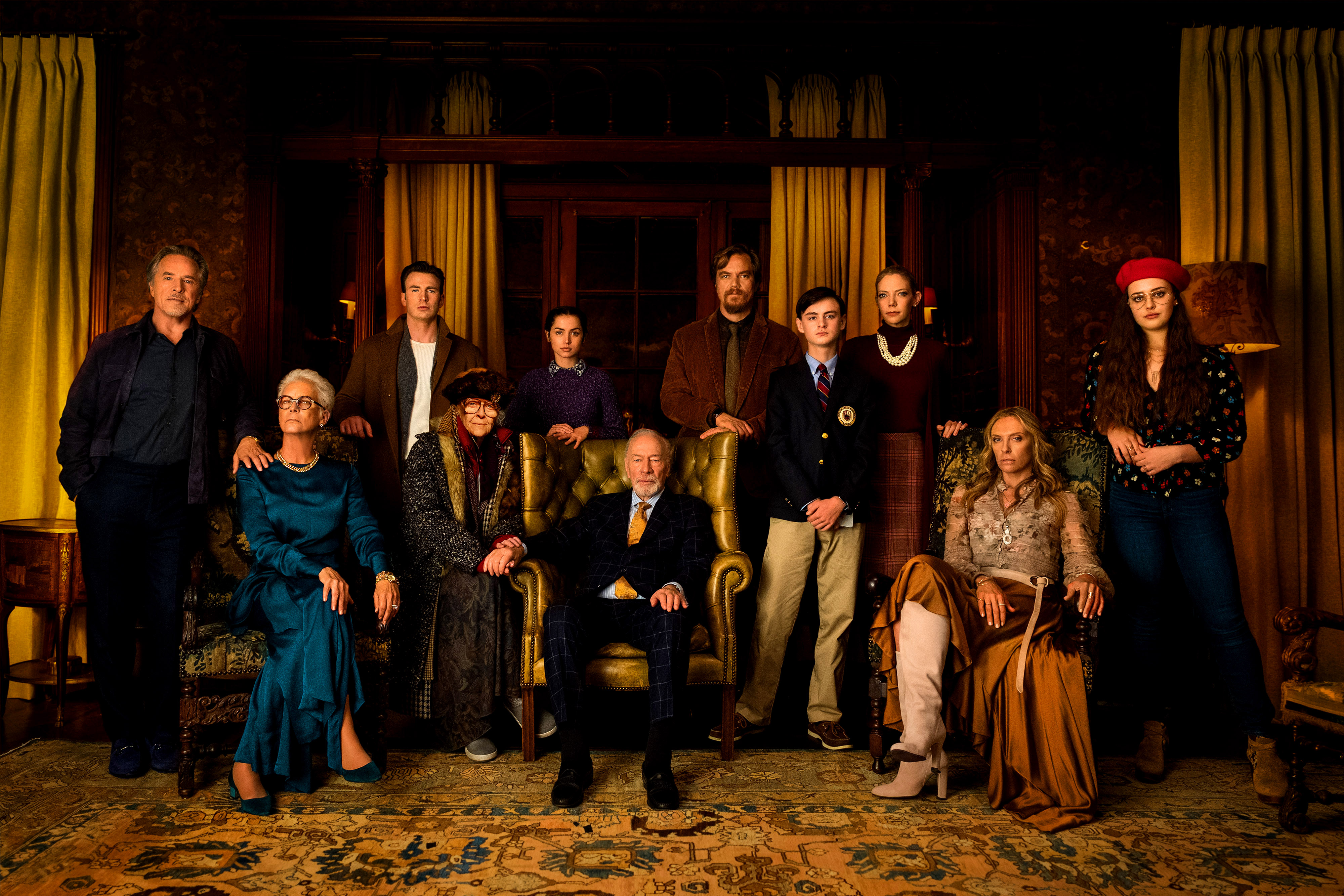Knives Out does what so many of the best mysteries do: Carve up the rich
The new film by Rian Johnson has a radical class politics — just like Agatha Christie's stories or Columbo


A free daily email with the biggest news stories of the day – and the best features from TheWeek.com
You are now subscribed
Your newsletter sign-up was successful
For his wildly entertaining new murder-mystery movie Knives Out, writer-director Rian Johnson has lined up an all-star cast, nearly every one of whom is playing a fabulously wealthy creep. Don Johnson plays the philandering spouse of a snippy real estate mogul, played by Jamie Lee Curtis. Chris Evans is their stubbornly unserious playboy son. Michael Shannon plays his millionaire father's staunchly right-wing business manager, raising a teenage son who's a Neo-Nazi internet troll. And Toni Collette is a self-styled social media influencer, burning through her late husband's family fortune.
Most of these characters are — whether they realize it or not — moochers. The clan's patriarch is the mega-successful mystery novelist Harlan Thrombey, played by Christopher Plummer. When he dies under mysterious circumstances, a shrewd southern dandy detective named Benoit Blanc (Daniel Craig) scrutinizes the potential suspects one-by-one. And one-by-one, he reveals that even if they didn't actually kill Harlan, they've spent most of their lives bleeding him dry ... and then congratulating themselves for being self-made millionaires.
This premise may seem like an aggressively woke spin on a classic genre. And I haven't even mentioned Harlan's beloved nurse: an undocumented immigrant's daughter named Marta Cabrera (Ana de Armas), who helps steer Benoit's investigation, even as her late employer's family belittles and marginalizes her. (One running joke is that no Thrombey can remember her nationality; it's all pretty much "somewhere brown-skinned people come from" to them.)
The Week
Escape your echo chamber. Get the facts behind the news, plus analysis from multiple perspectives.

Sign up for The Week's Free Newsletters
From our morning news briefing to a weekly Good News Newsletter, get the best of The Week delivered directly to your inbox.
From our morning news briefing to a weekly Good News Newsletter, get the best of The Week delivered directly to your inbox.
But while Johnson definitely intends Knives Out to be a commentary on the political and class divisions of 2019, he's not breaking new ground here. The detective/mystery genre has long been fairly radical. In Raymond Chandler's novels, some swell walks through Philip Marlowe's door, and before long the P.I.is bouncing between elegant mansions and sordid dens of iniquity, sniffing out the scandals that the rich and famous would rather he bury. Distrusting the upper-class isn't just a recurring theme in these stories; it's a plot-driver.
Knives Out isn't inspired by the noir shadings of Chandler so much as it is by '70s TV detective shows and Agatha Christie's drawing-room mysteries. But all of these largely share Chandler's nuanced understanding of how people too often conflate having a lot of money with cultural superiority.
On the surface, Knives Out is very much like one of the star-studded old movie adaptations of Christie novels like Death on the Nile and Murder on the Orient Express — the kind of films where the posters featured all the actors' faces in tiny boxes. Much of the fun of the movie comes from watching skilled pros like Collette, Curtis, Johnson, and Shannon lean into playing such broadly malevolent, fiercely selfish, unselfconsciously smug plutocrats. Evans and Craig especially look to be having a ball, loosed from the demands of playing the stodgy Captain America and James Bond, now free to go broad as walking, talking cartoons.
Structurally, Johnson borrows from Sleuth and Deathtrap, two movies (both based on plays) that spring huge surprises every 30 minutes or so, defying the audience's presumptions. But Johnson also, somewhat incongruously, takes from Columbo, a TV show that usually told viewers more than even the hero knew. A Columbo episode nearly always starts with the who, how, and why of a murder, then spends the next hour or so following LAPD homicide detective Lt. Columbo as he pecks away at snobby killers who are certain they've committed the perfect crime.
A free daily email with the biggest news stories of the day – and the best features from TheWeek.com
The Rockford Files, Barnaby Jones, Cannon. Each of these shows also pitted lumpy, world-weary types against the kind of glamorous people that '70s TV viewers might've read about in, well, People. Of all the classic '70s detective series though, Columbo was the most overt with its class-conflict themes.
Peter Falk played Columbo as a seemingly in-over-his-head LAPD lifer, clad in a rumpled trench coat and driving a beat-up old car. He'd disarm suspects with his obsequiousness, peppering them with deceptively flattering inquiries into the lifestyles of the rich and famous. How do all their fancy, expensive gadgets work? What's the best way to pick a good bottle of wine? What does a bigwig do all day? Before they knew what had happened, Columbo had asked the one question that exposed their biggest mistake.
Knives Out waits until roughly the end of its first act before jumping into an extended flashback that reveals how Harlan died and who was involved. Then, Columbo-style, we watch as the chief suspect shadows Benoit, desperately trying to steer the detective away from the clues. It's all wonderfully suspenseful, watching a smart P.I. piece together what we already know.
Benoit Blanc is ultimately more of a Christie or a Dashiell Hammett-style hero than a Columbo. He's dapper and eloquent, and he projects a know-it-all confidence that makes his quarry nervous. Still, like many of the best detectives, he combines a deep cynicism about human nature with a sentimental attachment to underdogs and lost causes.
Knives Out can be savage in its depiction of the Thrombey family. But what makes it such a crowd-pleaser is that Johnson also expresses a reassuring optimism that human decency will prevail, and that justice will favor the hard-working and good-hearted over the pernicious and self-serving — no matter how loaded they may be.
This, in essence, is the appeal of these stories where a Miss Marple or a Sam Spade wears a criminal down. It's not that the great mystery writers think millionaires are inherently evil. It's more that they recognize the common, infuriating belief among aristocrats that money should buy them the benefit of the doubt. Their stacks of cash are meant to insulate them from any consequences.
In another Columbo-esque move in Knives Out, the suspects play along with the investigation until it starts to cut a little too close to the truth, at which point they presume they have the power to end it. They're not used to being questioned, so they figure their cooperation is wholly voluntary.
But the most original twist in this rollicking, unpredictable whodunnit doesn't involve a key clue or a shocking revelation. It's more about the way the detective hero peels away the Thrombeys' defenses, by forcing them to admit how little they've actually accomplished in their lives.
In some mysteries, the rich pay any price to keep the public from finding out about some sexual indiscretion or long-buried crime. In Knives Out, the scandal is more insidious: It's that these wealthy people who demand deference have never really earned a penny of their income. It's a secret that runs so deep, even the people carrying it are clueless.
Want more essential commentary and analysis like this delivered straight to your inbox? Sign up for The Week's "Today's best articles" newsletter here.
Noel Murray is a freelance writer, living in Arkansas with his wife and two kids. He was one of the co-founders of the late, lamented movie/culture website The Dissolve, and his articles about film, TV, music, and comics currently appear regularly in The A.V. Club, Rolling Stone, Vulture, The Los Angeles Times, and The New York Times.
-
 The Epstein files: glimpses of a deeply disturbing world
The Epstein files: glimpses of a deeply disturbing worldIn the Spotlight Trove of released documents paint a picture of depravity and privilege in which men hold the cards, and women are powerless or peripheral
-
 Jeff Bezos: cutting the legs off The Washington Post
Jeff Bezos: cutting the legs off The Washington PostIn the Spotlight A stalwart of American journalism is a shadow of itself after swingeing cuts by its billionaire owner
-
 5 blacked out cartoons about the Epstein file redactions
5 blacked out cartoons about the Epstein file redactionsCartoons Artists take on hidden identities, a censored presidential seal, and more
-
 Walter Isaacson's 'Elon Musk' can 'scarcely contain its subject'
Walter Isaacson's 'Elon Musk' can 'scarcely contain its subject'The latest biography on the elusive tech mogul is causing a stir among critics
-
 Welcome to the new TheWeek.com!
Welcome to the new TheWeek.com!The Explainer Please allow us to reintroduce ourselves
-
 The Oscars finale was a heartless disaster
The Oscars finale was a heartless disasterThe Explainer A calculated attempt at emotional manipulation goes very wrong
-
 Most awkward awards show ever?
Most awkward awards show ever?The Explainer The best, worst, and most shocking moments from a chaotic Golden Globes
-
 The possible silver lining to the Warner Bros. deal
The possible silver lining to the Warner Bros. dealThe Explainer Could what's terrible for theaters be good for creators?
-
 Jeffrey Wright is the new 'narrator voice'
Jeffrey Wright is the new 'narrator voice'The Explainer Move over, Sam Elliott and Morgan Freeman
-
 This week's literary events are the biggest award shows of 2020
This week's literary events are the biggest award shows of 2020feature So long, Oscar. Hello, Booker.
-
 What She Dies Tomorrow can teach us about our unshakable obsession with mortality
What She Dies Tomorrow can teach us about our unshakable obsession with mortalityThe Explainer This film isn't about the pandemic. But it can help viewers confront their fears about death.
